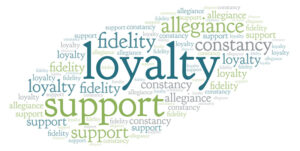 Several years ago, I had a stunning conversation with someone who worked in the public relations industry. She was employed by a large technology company that I was covering closely as a journalist. Her company was in trouble, and all signs pointed to something deeper than a sagging global economy as the reason. In other words, the company was headed for an ugly, scandal-scarred death. “Do you think I should quit and walk away now?” she asked me.
Several years ago, I had a stunning conversation with someone who worked in the public relations industry. She was employed by a large technology company that I was covering closely as a journalist. Her company was in trouble, and all signs pointed to something deeper than a sagging global economy as the reason. In other words, the company was headed for an ugly, scandal-scarred death. “Do you think I should quit and walk away now?” she asked me.
“Yes,” I said. I did not take the conversation, or the situation, lightly. I had built a good relationship with her, and I felt we trusted each other on a personal and professional level.
She quit two days later and never looked back. Her former employer was out of business within six months. Lawsuits flew; accusations were reported; people were dragged through the mud. My friend’s name was never mentioned, but her replacement spent more than a few days giving depositions and sitting on a witness stand.
These days, I still see my friend’s name pop up in the media. She heads the public relations department of another technology company. Her replacement has apparently left the business.
Loyalty is an important trait, but when does loyalty become self-defeating? Public relations consultants need to be loyal, of course, and need to believe in what they’re selling, which is often the story of the company itself. PR people, however, are not normally involved with intimate details of the business.
If we examine the corporate scandals of the past few years, it’s been the top executives, finance professionals, and folks in the investor relations department that have been the cause of fraud. I’ve yet to see a public relations flack take the fall in a major scandal, and oftentimes PR people have stuck around through scandals to help new management do damage control.
Those in the public relations industry need to be careful though. Too much loyalty can lead to a professional and/or personal downfall. To put it in simple terms: If you don’t believe what you’re saying, are you doing yourself any favors? To answer this question, I turned to a former WorldCom PR consultant who stayed with the company through the scandal.
“I honestly believed what I was being told by management,” she said. “I never knowingly lied to anyone.” But would she have lied had she known the truth?
“That’s the hardest question I kept asking myself. Would I have blown the whistle, or walked away, had I known something fishy was going on? I would like to think I would have done the right thing, but I don’t know. It’s funny because I had this conversation with a lot of people I worked with and most people said they would have just gotten out of Dodge and maybe called the SEC or a journalist, or something. Few people said they would actually blow the whistle.”
My friend who left her public relations job because of what she felt was an imminent scandal, said that she probably stuck around too long.
“I had to apologize to a lot of reporters because I told them what amounted to a bunch of lies, and the worst part was that I thought I may be lying,” she told me. “Most people understood that it wasn’t my fault. But some people told me that I should have known better — that I was sticking up for people who were liars and were hurting people and I knew it. I could never really respond to that except to say I was sorry and that I had made a mistake.”
She has some advice for public relations employees, or any employees, faced with evidence that something could be wrong at their company.
“First, you should protect yourself. When I was preparing to leave my job, I was scared to death that I would be dragged into court and sued by shareholders. I got a lawyer, and he told me what to do.
“Second, document the fraud or illegal activity the best that you can,” she continued. “Then get your lawyer to come with you and go quit your job. And try to make sure your lawyer is a big guy!”
This article, written by Ben Silverman, originally appeared in PR Fuel (https://www.ereleases.com/prfuel), a free weekly newsletter from eReleases (https://www.ereleases.com), the online leader in affordable press release distribution. To subscribe to PR Fuel, visit: https://www.ereleases.com/prfuel/subscribe/.
